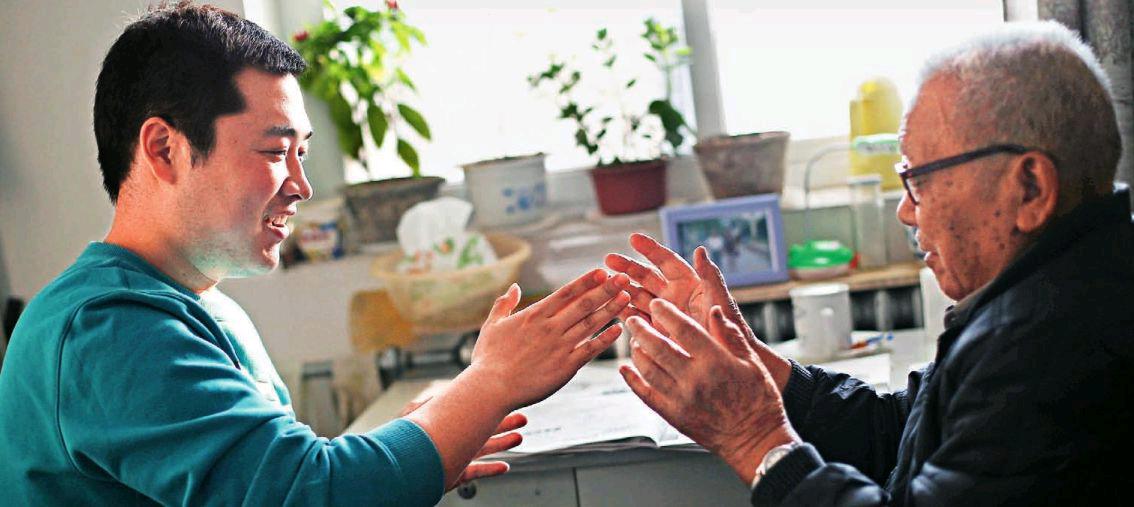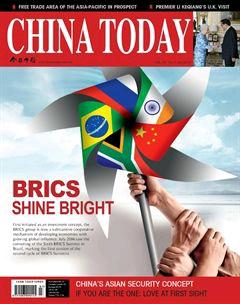A Young Man’s Dream of Serving Elders
By+staff+reporter+HOU+RUILI



YAN Shuai, a 26-year-old Bei- jinger, is the head of Puleyuan Nursing Home, located in a Beijing suburb. The facility currently caters to over 300 seniors, the oldest 106 years of age. Sixty percent of the residents are incapable of taking care of themselves.
A decade ago Chinese people turned to nursing homes only when they had no family to depend on. But attitudes have changed dramatically in recent years. Increasingly more elders with children consider moving to care homes when they have trouble taking care of themselves, as they dont want to become a burden to their children.
Grown-up Overnight
Yan is the only child of an affluent family. At the age of 18, he graduated from a technical secondary school and found a job in the IT industry. He was not earning much, yet managed to maintain a lavish lifestyle as he still lived with his parents. The young man squandered most of his free time going to nightclubs and street dances, or playing computer games. The same year, Yans parents invested over RMB 5 million to establish the Puleyuan Nursing Home. He didnt give it much thought. At that time he was dreaming of becoming a pop-star and never concerned himself about the family business.
However, things changed all of a sudden. One year later, when the nursing home, which had cost almost all the familys savings, was still struggling, Yans mother was diagnosed with cancer, soon after which his father suffered a stroke and developed uremia.
Yan Shuai grew up quickly under this unexpected misfortune. He quit his IT job and took over the nursing home from his father. As the business could not bring in enough money to support his parents medical expenses, Yan had to take several part-time jobs for some time, including selling souvenirs and purses, and driving taxi, in order to feed the family. It was not rare for him to sleep only for two to three hours a day.
But the nursing home became his priority. Yan quickly adapted to his new role as the top manager of the seniors residence. He started learning every single skill involved, including nursing, cooking, procurement and first aid, so as to become a professional service provider. For the first time in his life, he helped to turn paralyzed people over in their beds, give them sponge baths, treat bedsores, and change diapers, to name a few tasks. He not only learned about the traditional customs for funeral ceremonies, but also handled almost every detail for many funerals. As he became experienced and established in this trade, Yan was invited by some universities and companies to give lectures on eldercare to graduates venturing into this field.
Becoming so familiar with all types of work in the nursing home has enabled Yan to improve its management and reduce costs, which led to a fall in the price. Consequently, the seniors could pay less for the services.
Those residents who are capable of taking care of themselves are charged RMB 1,800 per month for a single room. Those who need 24-hour attention are charged from RMB 2,800 to 3,600. All rooms are equipped with televisions, air-conditioners, fridges, showers and toilets with grab bars.
“Ive striven to build an old-age home that is affordable for ordinary people,”Yan said. “At the current rates, we are able to make ends meet if we dont take land depreciation into consideration.”
The relatively low rates have attracted more elders, and Puleyuan has expanded rapidly to meet the rising demand. At first, there were just 50 beds in two rows of single-storey houses. But today, it has three rows of single-storey houses and a three-storey building, with a total of 323 beds. In addition, a new complex with 125 beds is under construction, with the aim of offering comprehensive medical and rehabilitation services.
Yan met his wife after he had taken over the nursing home. The couple now run the facility. Yans mother, recovering after an operation, sometimes lends them a hand. Yans father often chats with other seniors to relieve their loneliness. The project is truly a family business.
Emotional Bonds
Yan does his best to provide friendly services and management, so as to make the elders feel at home.
Seniors are usually scared by an unfamiliar environment. So when newcomers move in, Yan Shuai always first asks about their hobbies, and introduces them to other residents who share the same interests, so they can make friends.
“The aged, unlike young people, tend to become isolated from others,” Yan said. “What we need to do is encourage them to spend some time together and help them better integrate into the group.”
During our interview, I heard a careworker telling a story in the corridor. It turned out that she was coaxing a resident to walk to her room for a midday rest. The resident was suffering from dementia, so was patiently treated like a child.
“For those who have lost day-to-day life skills, we sometimes have to go to the extent of reading their facial expres- sions to find out their needs,” Yan said. An old man who survived a cerebral hemorrhage was bed-bound and unable to talk. One time he wore a painful expression and blinked all the time. Yan Shuai inquired whether he had any pain or itching on his head, arms or legs, but the old man only shook his head. Eventually, when Yan said the word “back,”the old man blinked in succession. Yan scratched his back, and applied some body lotion. The resident finally wore a look of relief.
Yan is personally involved in caregiving whenever possible. “As the head of the nursing home, Im expected to set an example. Providing good care and service is the main principle for running an elders home.”
Yan worries most about critically ill residents. Emergencies often arise after midnight, so Yan keeps his cellphone on 24/7. “I often sleep with my clothes on, ready to be woken up by emergency calls when someone falls ill,” Yan said, admitting that the high stress has begun to harm his own health. This young man suffers from arrhythmia, hypertension and hyperglycemia.
Yan plans to open an infirmary at his nursing home, since the nearest hospital is more than a 10-minute drive – quite a distance for an emergency. He intends to cooperate with nearby hospitals to introduce basic medical services into the nursing home, and to connect it with the state medical insurance system for the convenience of Puleyuan residents.
As the government invests more funds in the social service industry, the situation is getting better for Puleyuan. The Beijing Hypertension Association approached the nursing home, and donated a batch of medical equipment including ECG machines, a type-B ultrasound scanner, and hospital beds. Some of the supplies were secondhand. “We dont mind using old equipment from large hospitals. To us, its timely aid,”Yan said.
“Emotional bonds exist between the staff and the residents. When an elder passes away, we may be even more grieved than the close relatives. The hardest moment for me is to observe their desire to live as they approach the end. Thats why I dream of building a better nursing home where seniors enjoy a richer cultural life,” Yan said.
As soon as the new building is completed, Yan plans to hold lectures on various subjects there, such as Buddhism, traditional Chinese arts, and studies on ancient Chinese civilization. He believes that a richer cultural life may enable seniors to gain a better understanding of life and death.
Not Measurable by Money
Yan Shuai has always endeavored to deliver good services at relatively low prices. “Im working to establish our own brand of related products, hoping to supplement the nursing homes incomes.” In 2012, the Puleyuan trademark was registered. “Our products may range from adult diapers to ambulance vehicles. The income generated by these products will enable us to open a chain of homes for the elderly and build standardized service teams. We may gradually gain a large set of clientele, and deliver further services and products according to their needs.”
The over-60 population in China now numbers around 200 million, accounting for 14.9 percent of the national population. This age group is expected to boom in the next two decades, and will probably take up one third of the Chinese population by 2050. The elderly services business has a huge market and the profit margin is projected to grow.
Nevertheless, Yan Shuai adheres to his low-price philosophy. He had been approached by someone who wanted to buy the Puleyuan for RMB 24 million, planning to transform it into a high-end facility catering to rich seniors. But Yan rejected the offer. “It was big money. I could live a comfortable life just off the interest, rather than cope with such pressures on a daily basis. But how could I neglect all the seniors living on modest retirement pensions? Most old people need affordable homes.”
“The meaning of life lies in the creation of value. It is meaningless to indulge in a life of wealth without contributing to society. And wealth is not always measured in terms of money,” Yan concluded.

